私たちの主な研究テーマ
- 偏見と分断の原因を探り
共生と受容をめざす集団間関係
政治心理学 - 「善いこと」「悪いこと」の
認知とは?道徳心理学
心理学と法 - 心と文化の相互関係
―その謎を解く文化心理学
コミュニケーションと文化
研究室について
私たちのゼミでは、広い意味での「社会的認知」を研究の中心テーマとしています。
社会的認知というのは社会心理学の中の一領域で、
人間がどのようにして、周囲の人々や所属集団、自分の住んでいる世界などについて意味を見出し、
理解を形成しているのかを明らかにすることを主な目的としています。
研究ギャラリー
日本人の国民意識
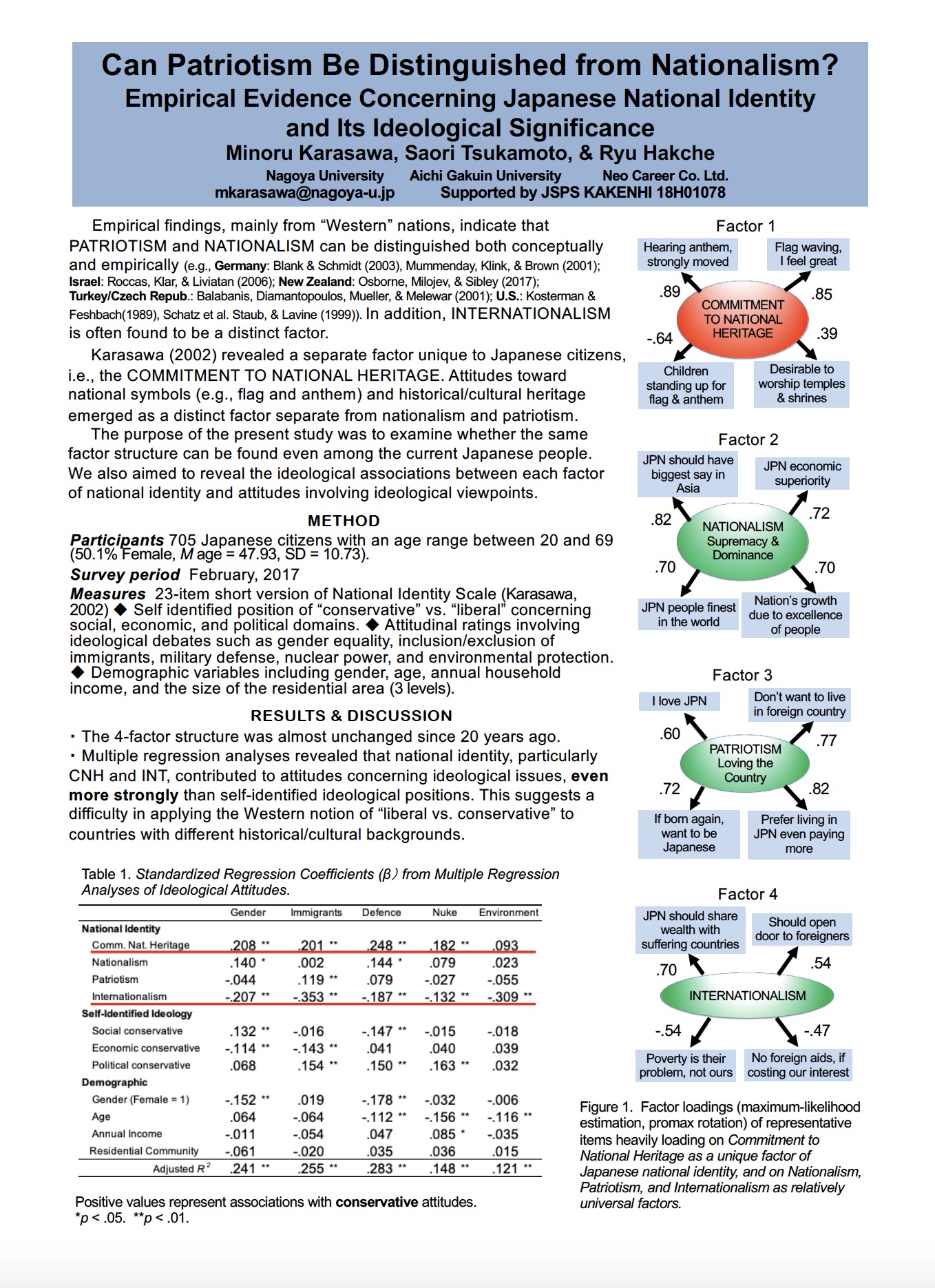
Karasawa, Tsukamoto, & Ryu (2020). Can patriotism be distinguished from nationalism? Empirical evidence concerning Japanese national identity and Its ideological significance. SPSP (New Orleans, LA, USA) での発表ポスター
ステレオタイプと言語
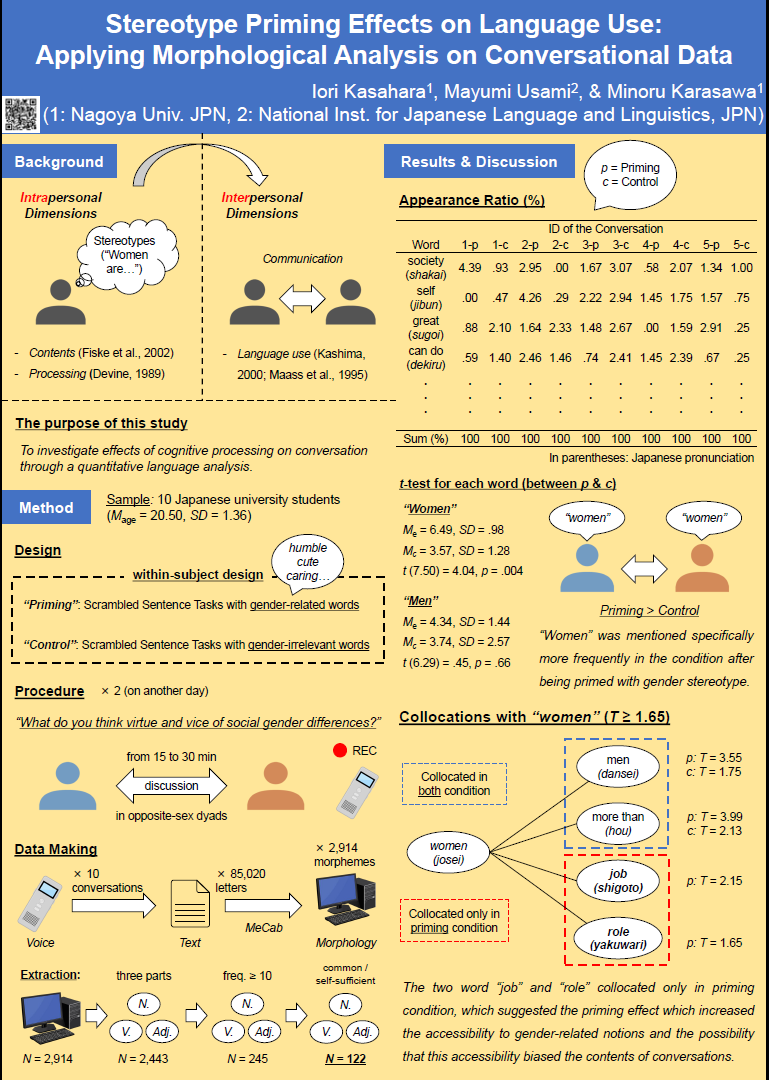
SPSP2020 (New Orleans, LA, USA) で博士後期課程1年(当時)の笠原が発表したポスターです。
Wice, Karasawa, Matsui, & Miller (2020)
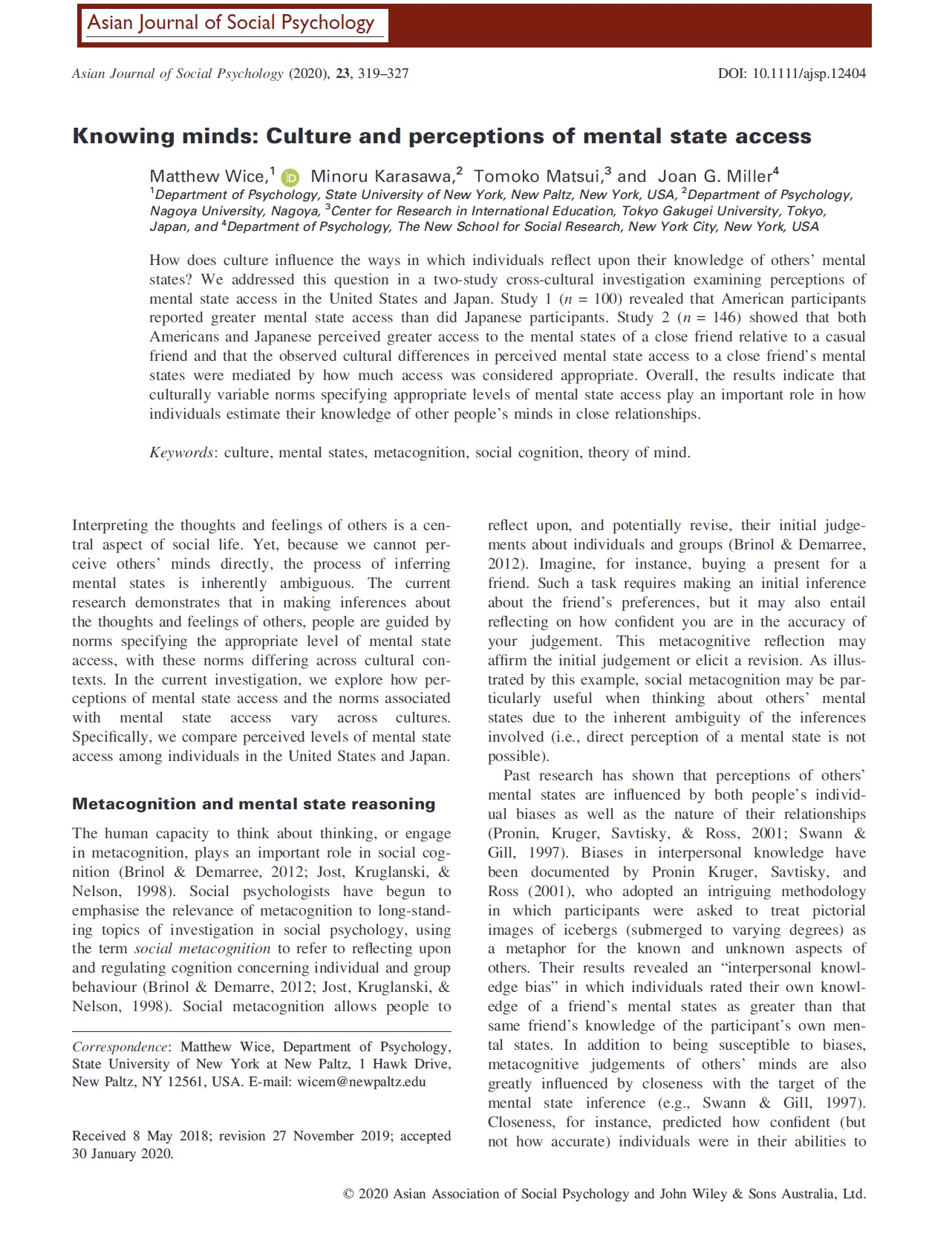
Knowing minds: Culture and perceptions of mental state access. Asian Journal of Social Psychology, 23, 319-327.
責任と法意識の人間科学(勁草書房)
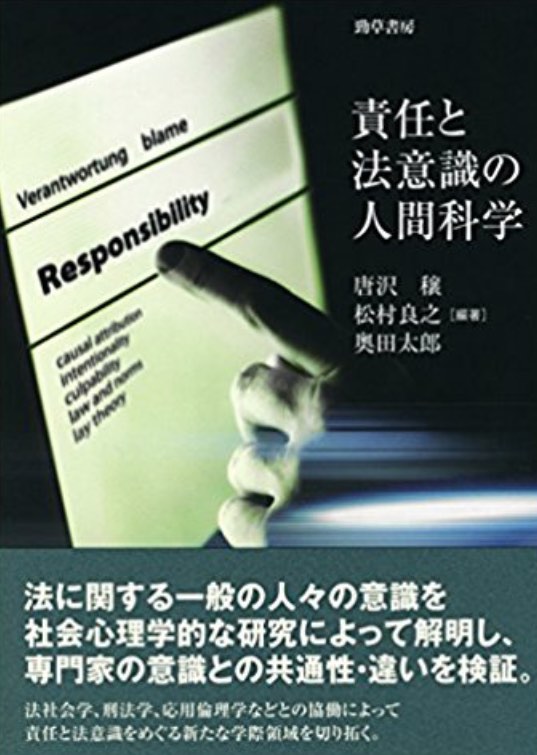
唐沢 穣・松村良之・奥田太郎(編著)2018年
分け隔てする心の仕組み
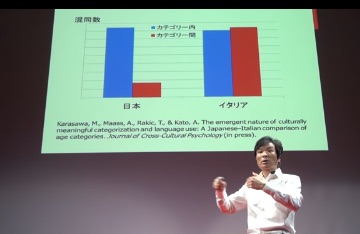
TEDxNagoyaU でのプレゼンテーション
国際研究ネットワーク
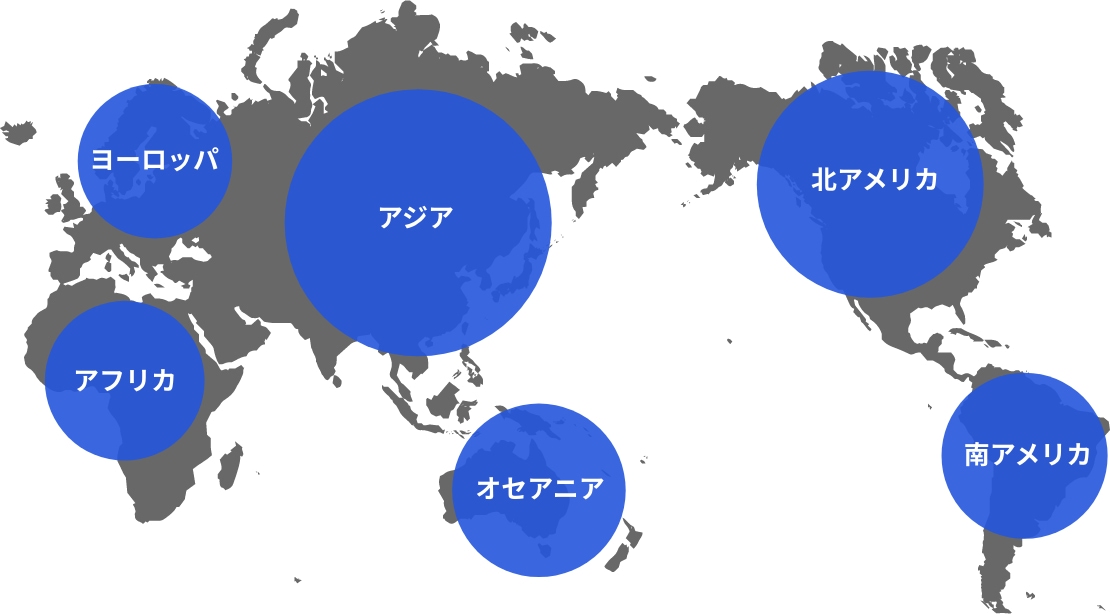
「北アメリカ」に登録されている論文を表示しています。
Experimental and cross-cultural evidence that parenthood and parental care motives increase social conservatism
Kerry, N., Al-Shawaf, L., Barbato, M., Batres, C., Blake, K. R., Cha, Y., Chauvin, G. V., Clifton, J. D. W., Fernandez, A. M., Galbarczyk, A., Ghossainy, M. E., Jang, D., Jasienska, G., Karasawa, M., Laustsen, L., Loria, R., Luberti, F., Moran, J., Pavlovic´, Z., Petersen, M. B., Smith, A. R., Zˇezˇelj, I., & Murray, D. R. (2022). Experimental and cross-cultural evidence that parenthood and parental care motives increase social conservatism. Proceedings of the Royal Society B, 289 , 20220978. https://doi.org/10.1098/rspb.2022.0978Despite the clear psychological importance of parenthood and the motivation to provide care for children, researchers have only recently begun investigating their influence on social and political attitudes. Because socially conservative values ostensibly prioritize safety, stability, and family values, we hypothesized that being more invested in parental care might make socially conservative policies more appealing.Perceived warmth of offending group moderates the effect of intergroup apologies
Awale, A., Chan, C., Tam, K., & Karasawa, M. (2022). Perceived warmth of offending group moderates the effect of intergroup apologies.
Group Processes & Intergroup Relations, 25, 1372-1394. https://doi.org/10.1177/1368430220961844Using actual and fictional scenarios, we examined whether the apology–forgiveness relationship and the apology–remorse relationship were dependent on the victim group members’ perceived warmth of the offending group.Individual, group, and temporal perspectives on the link between wealth and realistic threat
Celikkol, G., Renvik, T. A., Sortheix, F. M., Jasinskaja-Lahti, I., Jetten, J., Ariyanto, A., Autin, F., Ayub, N., Badea, C., Besta, T., Butera, F., Costa-Lopes, R., Cui, L., Fantini, C., Finchilescu, G., Gaertner, L, Gollwitzer, M., Gómez, A. González, R., Hong, Y.-y., Jensen D. H., Karasawa, M., Kessler, T., Klein, O., Lima, M., Megevand, L., Morton, T., Paladino, P., Polya,T., Ruza, A., Shahrazad, W., Shama, S., Smith, H. J.,Torres, A. R., van der Bles, A. M., & Wohl, M. J. A. (2022). Individual, group, and temporal perspectives on the link between wealth and realistic threat. Current Research in Ecological & Social Psychology, 3. https://doi.org/10.1016/j.cresp.2022.100054In this 28-country study (N = 6112), we assessed how subjective perceptions and objective indicators of wealth were associated with majority group members’ perceptions of realistic threat related to immigration.Materialist and post-materialist concerns and the wish for a strong leader in 27 countries
Lima, M. E. O., de França, D. X., Jetten, J., Pereira, C. R., Ariyanto, A., Autin, F., Ayub, N., Badea, C., Tomasz Besta, T., Butera, F., Costa-Lopes, R., Fantini, C., Finchilescu, G., Gaertner, L., Gollwitzer, M., Ángel Gómez, Á, González, R., Hong, Y-y., Jensen, D. H., Karasawa, M., Kessler, T., Klein, O., Jasinskaja-Lathi, I., Megevand, L., Morton, T., Paladino, P., Polya, T., Renvik, T. A., Ruza, A., Shahrazad, W., Shama, S., Smith, H. J., Torres, A. R., van der Bles, A. M., & Wohl, M. J. A. (2021). Materialist and post-materialist concerns and the wish for a strong leader in 27 countries. Journal of Social and Political Psychology, 9(1), 207-220. https://doi.org/10.5964/jspp.6213We explore whether objective higher levels of democracy are differentially associated with materialist and post-materialist concerns and, in turn, whether this is related to the wish for a strong leader.Knowing minds: Culture and perceptions of mental state access
Wice, M., Karasawa, M., Matui, T., & Miller J. G. (2020).
Asian Journal of Social Psychology, 23, 319-327. DOI: 10.1111/ajsp.12404How does culture influence the ways in which individuals reflect upon their knowledge of others’ mental states? We addressed this question in a two-study cross-cultural investigation examining perceptions of mental state access in the U.S. and Japan.Negative desires make failure to help more blameworthy: The role of wrongness and moral character evaluations
Hirozawa, P. Y., & Karasawa, M. (2020). Negative desires make failure to help more blameworthy: The role of wrongness and moral character evaluations.
Journal of Human Environmental Studies, 18(2), 119-126. DOI: 10.4189/shes.18.119Understanding collective guilt: Tolerance for contradiction and state-trait dissociations in perceived overlap between ingroup members.
Brown, C. M., Goto, N., Tsukamoto, S., & Karasawa, M. (2020). Understanding collective guilt: Tolerance for contradiction and state-trait dissociations in perceived overlap between ingroup members.
Current Psychology (published on line, March 11). DOI: 1007/s12144-020-00684-6Measurement invariance of the moral vitalism scale across 28 cultural groups
Rudnev, M., Vauclair, C. M., Aminihajibashi, S., Becker, M., Bilewicz, M., Castellanos Guevara, J. L., Collier-Baker, E., Crespo, C., Eastwick, P., Fischer, R., Friese, M., Gomez, A., Guerra, V., Hanke, K., Hooper, N., Huang, L. L., Karasawa, M., Kuppens, P., Loughnan, S., Peker, M., Pelay, C., Pina, A., Sachkova, M., Saguy, T., Shi, J., Silfver-Kuhalampi, M., Sortheix, F., Swann, W., Tong, J., Yeung, W. L. V., & Bastian, B. (2020). Measurement invariance of the moral vitalism scale across 28 cultural groups.
PLoS ONE, 15(6): e0233989. DOI: 10.1371/journal.pone.0233989Explaining illness with evil: Pathogen prevalence fosters moral vitalism.
Bastian, B., Vauclair, M., Loughnan, S., Bain, P., … Karasawa, M., et al. (2019). Explaining illness with evil: Pathogen prevalence fosters moral vitalism.
Proceedings of the Royal Society B: Biological Sciences.Verbal display rule knowledge: A cultural and developmental perspective.
Wice, M., Matsui, T., Tsudaka, G., Karasawa, M., & Miller, J. G. (2019). Verbal display rule knowledge: A cultural and developmental perspective.
Cognitive Development, 52 (in print; published online, June 25). DOI: 10.1016/j.cogdev.2019.100801.How can I become a member of my culture?: Shared representations of community-related moral violation in Japan and the U.S.
Matsuo, A., Brown, C. M., Norasakkunkit, V., & Karasawa, M. (2019). How can I become a member of my culture?: Shared representations of community-related moral violation in Japan and the U.S.
Culture and Brain. DOI: 10.1007/s40167-019-00084-z“Our country needs a strong leader right now”: Economic inequality enhances the wish for a strong leader.
Sprong, S., Jetten, J., Wang, Z., Peters, K., Mols, F., Verkuyten, M., Bastian, B., … Karasawa, M., et al., (2019). “Our country needs a strong leader right now”: Economic inequality enhances the wish for a strong leader.
Psychological Science, 30, 1-13. DOI: 10.1177/0956797619875472Regaining in-group continuity in times of anxiety about the group’s future: A study on the role of collective nostalgia across 27 countries.
Smeeks, A., Jetten, J., Verkuyten, M., Wohl, M. J. A., Jasinskaya-Lahti, I., …, Karasawa, M. et al. (2018). Regaining in-group continuity in times of anxiety about the group’s future: A study on the role of collective nostalgia across 27 countries.
Social Psychology. (Published online, October 9). DOI: 10.1027/1864-9335/a000350Cultural values moderate the impact of relative deprivation.
Smith, H. J. , Ryan, D. A., Jaurique, A., Pettigrew, T. F., Jetten, J., …. Karasawa, M., et al. (2018). Cultural values moderate the impact of relative deprivation.
Journal of Cross-Cultural Psychology, 49, 1183-1218. DOI: 10.1177/0022022118784213Revisiting the measurement of anomie.
Teymoori A, Jetten J, Bastian B, Ariyanto A, Autin F, Ayub N, et al. (2016) Revisiting the measurement of anomie.
PLOS ONE, 11(7): e0158370. DOI:10.1371/journal.pone.0158370Psychological essentialism and nationalism as determinants of interethnic bias.
Tsukamoto, S., Enright, J., & Karasawa, M. (2013). Psychological essentialism and nationalism as determinants of interethnic bias.
Journal of Social Psychology,153 (5), 515-519. doi: 10.1080/00224545.2013.795926.Challenging Canadian multiculturalism: Lay perceptions of Canadian national identity.
Tsukamoto, S., Gonzales, V., & Karasawa, M. (2010). Challenging Canadian multiculturalism: Lay perceptions of Canadian national identity.
Journal of Human Environmental Studies, 8(1), 25-31.Category size and judgment of variability: The effects of seeing the trees in the forest.
Karasawa, M., & Brewer, M. B. (1996). Category size and judgment of variability: The effects of seeing the trees in the forest.
Japanese Psychological Research, 38, 213-223. https://doi.org/10.1111/j.1468-5884.1996.tb00026.x



